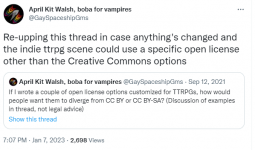This is a (+) thread. If you aren't interested in talking about what we'd find acceptable in a new license, please find another discussion.
We are talking a lot about what isn't acceptable. But, let us think in terms of a counter-offer.
1) No OGL is revoked. Create the OGL v1.0b - it is the same as v1.0a, but includes the extra words that make it clearly irrevocable. The SRD for 3e, 3.5, and 5e remain under the OGL (and now can be used under the irrevocable license).
2) The new license is the "OneD&D Open License", or somesuch. So, not actually a new version of the OGL. OneD&D may be released under the OD&DOL, so folks who want to work explicitly with OneD&D can do so, and can't revert it to OGL.
3) WotC can reserve rights to commercial videogames, software, movies, TV, novels and such. That's fair.
3a) Non-commercial software and media are allowed. Actual play programs are explicitly differentiated from other reserved media, and explicitly allowed.
4) WotC can have rights to some royalties from big players, but they are a percentage of profits, rather than percentage of revenue. That way, a runaway success product or new publisher can't accidentally find themselves taking a loss due to royalties.
What am I missing? I may take good suggestions from the thread and add them to the list above.
I'm sorry but at this stage the only acceptable position is for WotC to hand over complete control over pre-One D&D to an open source organization. Nobody's going to trust WotC if they offer anything less, where they try retaining control.
I am not a lawyer so I can't provide specific changes. I can only offer quotes pointing out the changes people find unacceptable.
* We can modify or terminate this agreement for any reason whatsoever, provided We give thirty days’ notice.
No, any license where You can destroy a business at your whim is unacceptable
* But if you want to publish SRD-based content on or after January 13, 2023 and commercialize it, your only option is to agree to the OGL: Commercial.
This is preposterously little time.
* We may terminate the agreement immediately if
Nobody will do business with you if you claim the right to shut us down for no reason.
* You agree to give Us a nonexclusive, perpetual, irrevocable, worldwide, sub-licensable, royalty-free license to use that content for any purpose,
No. Just no.
Basically, the new license is the complete opposite of the old license. Instead of WotC opening up its content to licensors, this trappy document is interested in licensors opening up their content to WotC.
In short, the new OGL is pretty much irredeemable, unless everything WotC wants to accomplish is ripped out. So that's a "plus comment", I guess.
But in that case, it must be asked: why not start over with an open license such as Creative Commons instead?



